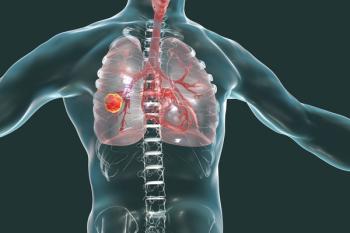
Quiz: Are EGFR Mutations and ALK Rearrangements in Lung Cancer Mutually Exclusive?
Know when to change targeted therapies in patients with progressive lung cancer? How about appropriate patient criteria for segmentectomy or wedge resection? Test your knowledge in our latest quiz.
Know when to change targeted therapies in patients with progressive lung cancer? How about appropriate patient criteria for segmentectomy or wedge resection? Test your knowledge in our latest quiz.
Question 1
Answer
C.EGFR and KRAS mutations and ALK rearrangements are mutually exclusive
EGFR and ALK rearrangements are mutually exclusive. However, overlapping EGFR and KRAS mutations occur in 1% of patients.[1]
Reference
1. Riely GJ, Politi KA, Miller VA, Pao W. Update on epidermal growth factor receptor mutations in non-small cell lung cancer. Clin Cancer Res. 2006;12:7232-41.
Question 2
A 56-year-old woman presents with symptoms of headache, gait imbalance, and frequent falls that she has been experiencing for 2 weeks’ duration. She is a non-smoker. Magnetic resonance imaging (MRI) of her brain shows a 2.5-cm left frontal enhancing lesion, and a chest computed tomography (CT) scan shows a 1.6-cm spiculated nodule in the left lower lobe. Other than the lung nodule, positron emission tomography (PET) imaging shows no areas of increased uptake. CT-guided biopsy of the lung nodule shows adenocarcinoma by morphology, with EGFR wild type and EML4-ALK translocation.
Answer
B.Resection of the brain and lung lesions followed by adjuvant radiation therapy to the brain and systemic chemotherapy
This is a presentation of oligometastatic disease, and attempts for curative resection followed by adjuvant local and systemic treatment would be most appropriate. There is no established data on adjuvant targeted therapy in this setting. The ALCHEMIST trial is testing that option, but data are not yet available. If the patient was presenting with metastatic incurable disease, first-line alectinib or brigatinib would be a good choice.[1]
Reference
1. Villaruz LC, Kubicek GJ, Socinski MA. Management of non-small cell lung cancer with oligometastasis. Curr Oncol Rep. 2012;14:333-41.
Question 3
A 65-year-old man, who has been diagnosed with an EML4-ALK–positive adenocarcinoma of the lung, has been treated with crizotinib for the past year. He now presents with symptoms of headache, gait imbalance, and frequent falls of 2 weeks’ duration. A brain MRI shows four lesions scattered in the brain parenchyma and associated vasogenic edema. PET/CT shows minimal change in his extracranial metastatic sites.
Answer
D. Any of the above
This is an EML4-ALK–positive metastatic adenocarcinoma of the lung that has progressed on crizotinib with symptomatic brain metastases but minimal change in extracranial metastatic sites. Local therapy to the brain lesions and continued systemic therapy with the same or different targeted agent are acceptable treatment options. According to guidelines from the National Comprehensive Cancer Network, if there were multiple progressive extracranial lesions, then the preferred option would be B.Change to alectinib and add stereotactic radiosurgery to metastatic brain lesions.
Question 4
Answer
D.Peripheral nodule equal to or less than 2 cm with radiographic doubling time of less than 400 days
Segmentectomy or wedge resection would be appropriate in selected patients with a peripheral nodule equal to or less than 2 cm with radiographic doubling time equal to or more than 400 days.[1]
Reference
1. Ost DE, Gould MK. Decision making in patients with pulmonary nodules. Am J Respir Crit Care Med. 2012;185:363-72.
Question 5
A 54-year-old non-smoking man presents with advanced metastatic non–small-cell lung cancer with brain metastases. Rapid screening of tumor tissue with immunohistochemistry suggests ALK rearrangements, and this is further confirmed by fluorescent in situ hybridization. The patient’s ECOG performance status score is 1.
Answer
C. Alectinib
The National Comprehensive Cancer Network panel members voted alectinib as a category 1 preferred agent for the first-line treatment of ALK-positive advanced non–small-cell lung cancer with asymptomatic brain metastases.[1]
Reference
1. Peters S, Camidge DR, Shaw AT, et al. Alectinib versus crizotinib in untreated ALK-positive non-small-cell lung cancer. N Engl J Med. 2017;377:829-38.
Newsletter
Stay up to date on recent advances in the multidisciplinary approach to cancer.





































